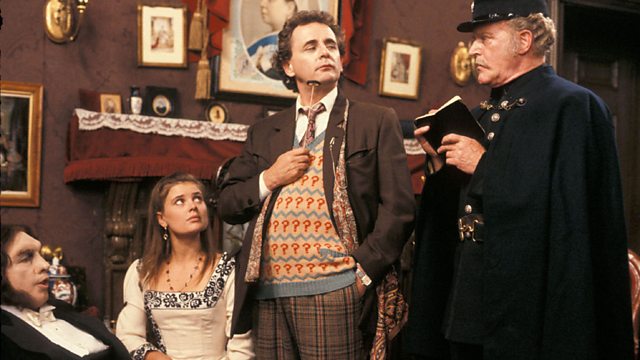The Doctor Who story ‘Ghost Light’ is one of the most complex in the series’ history, and was the last to be made before the show was axed.

Of course, Doctor Who is alive and well today, but back in 1989 the wind wasn’t blowing the good Doctor’s way. And although ‘Ghost Light’ wasn’t the last TV story to be broadcast (that would be ‘Survival‘) it was the last to be produced, ending the series’ record-breaking 26 year run.
And yet ‘Ghost Light’ (like much of Season 26) has remained a fan favourite in the years that have followed. The brainchild of writer Marc Platt, ‘Ghost Light’ was originally conceived as a rather different – and perhaps more controversial – story called ‘Lungbarrow,’ which was intended to explore the Doctor’s childhood house on Gallifrey. But the producer John Nathan-Turner quickly went off this idea, feeling it gave too much information away about the Doctor, and Platt was asked to rework his scripts.
During the redrafting process, Platt retained the idea of setting the story in a mysterious house, but changed the location to planet Earth in the 19th century, and made the companion Ace the focal point of the story. It wasn’t her childhood home, but it was a place that she had a deep personal connection with, having visited it as a teenager. Known as Gabriel Chase, the house unnerved her to such an extent that she burned it to the ground.
Her biggest mistake, though, was telling the Doctor about this traumatic childhood experience. Intrigued, he took her back to the mysterious house in Perivale in the 19th century, keen to understand what had really frightened Ace as a child.
And whilst the premise of ‘Ghost Light’ is relatively easy to grasp, it’s a story that requires concentration; missing just one line of dialogue can prove problematic for the casual viewer.
‘Ghost Light’s story actually begins thousands of years ago when an alien expedition came to Earth to catalogue its life forms. Led by a being called Light, the ship and its crew went into hibernation after the research had finished – everyone, that is, except Survey. He continued to evolve, casting off insect-like husks until he developed into the planet’s (then) dominant life-form – the Victorian gentleman – at which point he took the name Josiah Smith and made Gabriel Chase his home, with the alien ship lying dormant in its cellar.
By the time the TARDIS lands in 1883, Smith has concocted a masterplan to assassinate Queen Victoria and take control of the British Empire. To do this, he plans on using one of her friends – the explorer Redvers Fenn-Cooper – whom he has lured to Gabriel Chase to brainwash and imprison.
His plans, however, start going off the rails when another member of the expedition – Control – awakens and starts to evolve into a Victorian lady. She is followed shortly after by Light, who is shocked by the evolutionary changes that have occurred as he slept. He decides to halt evolution it in its tracks by destroying all living matter.
By this point, Fenn-Cooper has regained his senses, and Control has fully evolved into a Victorian lady. They form an alliance against Josiah Smith and return him to his original state, keeping him as a prisoner on board the expedition ship. Light, meanwhile, is persuaded by the Doctor that his plans are futile, and this causes Light’s brain to overload and dissipate throughout the house, creating the sinister presence that Ace felt when she was a child.
In short, ‘Ghost Light’ gives the viewer everything they need to follow the story, but there are a lot of moving parts and it can sometimes be tricky to understand how they fit together. Speaking on the Season 26 Blu-ray release of this adventure, the script editor Andrew Cartmel explained that one of the criticisms he’d received over the years was that people didn’t understand why Control was called Control when, for most of ‘Ghost Light,’ she doesn’t seem to be in control of very much.
Cartmel says that this confusion could be down to the lack of clarity about her name. Control actually refers to scientific control – that is, “an experiment or observation designed to minimise the effects of variables other than the independent variable.” (Thank you, Wikipedia!) Cartmel says that he thinks the character might have made more sense if viewers had been told what her name meant.
But, arguably, ‘Ghost Light’ would still have been a complex tale. Indeed, this was the intention of the writer Marc Platt, who felt strongly that his viewers shouldn’t be handed everything on a plate. He wanted to create something that challenged people and made them think, an effect that was felt even by the cast; the actor Sylvia Syms (who played Mrs Pritchard) apparently asked Platt at the read-through what he had been sprinkling on his corn flakes!
And yet the legacy of ‘Ghost Light’ has endured. The Seventh Doctor Sylvester McCoy has cited ‘Ghost Light’ as one of his favourite stories, whilst Andrew Cartmel has described it as “the jewel in the crown” of Season 26. These accolades are all-the-more impressive when it’s remembered that this was Marc Platt’s first professional writing job, having had no prior experience beyond writing fan fiction. As such, ‘Ghost Light’ is only the second story in the series’ history to be penned by a first-time writer, the other being Andrew Smith’s ‘Full Circle’ in 1980.
What did you enjoy most about ‘Ghost Light’? And did you understand it when you first watched it? Let me know in the comments below.

Seventh Doctor jumper – order now from the Lovarzi shop!

Watching Ghost Light Part 1 is my first DW memory, so I have a soft spot for it. There are some great lines – the “I face mine on my own terms!” scene and much of the Doctor’s dialogue; Mark Ayres’ score; the sets and costumes. It took me a while to piece it together but I love it.
So a few things I didn’t quite understand, is light somehow in Redvers Fenn-Cooper’s snuff box? Why is it radio active? and if it was so radioactive why did no one get radiation sickness?
Was the house Gabriel Chase.build on top on the spaceship under it? There was some very elaborate engineering with a hidden lift going down to the spaceship level, that would have taken significant expertise to build, was that how the expedition were woken up?
What is with all the night maids? All hypnotised? and living in a cupboard?
I think there are just too many loose ends watching the story for it really to hang together, I love the sets, it just feels that it could have been much more coherent and a better story as a result.